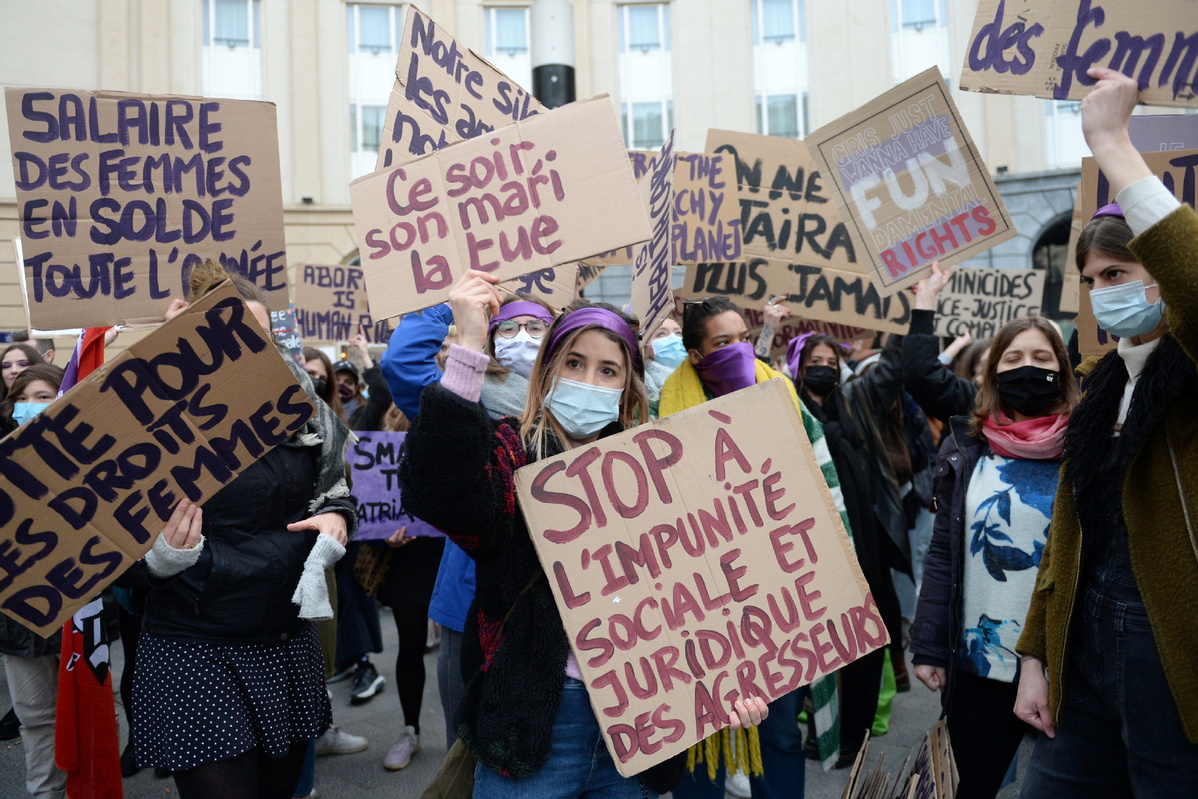Pandemic has put gender inequality in spotlight


The decision of a Beijing court to compensate a divorced woman for five years of unpaid housework has struck a chord well beyond China's borders amid a growing global debate on entrenched gender inequality.
The ruling came amid rising concerns that measures to combat COVID-19 have had a much bigger impact on women than on men and may have set back decades of advances in their economic status.
Operating under China's new Civil Code, the court decided in February that the spouse who contributed most to raising children, caring for elderly relatives and doing the housework is entitled to compensation in a divorce.
In most societies, and not just China, that is almost always the woman.
In the Beijing case, the ex-husband was ordered to pay 50,000 yuan ($7,670) to reflect the fact that his spouse had spent more time on raising their child and looking after their home.
The decision was widely reported in China and beyond, and was seized on in social media as an advance for the economic rights of women.
International business magazine The Economist reported that the ruling had been widely celebrated, saying that the division of housework was also unequal in the West, with women shouldering the majority of domestic chores and child-care responsibilities.
Coverage of the ruling by the BBC attracted a plethora of comments, many reflecting that of one viewer who said: "For hundreds of years women have been doing and continue doing the bulk of unpaid labor, which includes domestic chores and child-rearing. Society would not even exist without that 'invisible' labor."
But while many cheered what they saw as a small step toward a further recognition of women's economic rights, others warned that wider progress could be stalled by a pandemic during which women make up 70 percent of the world's healthcare workforce.
In an address this month to the United Nations Commission on the Status of Women, UN Secretary-General Antonio Guterres said the pandemic was having a devastating impact on women and girls, illustrating how deeply gender inequality remained embedded in the world's political, social and economic systems.
"The damage is incalculable and will resound down the decades, into future generations," he warned.
Women accounted for most of the jobs that had been hit the hardest by the pandemic, while their unpaid care work had risen dramatically owing to factors such as stay-at-home orders, the closure of schools and childcare facilities, and an increased need to care for the elderly, according to the UN chief.
Men continued to dominate public life, Guterres said, and he called for women to be more involved in decision-making processes. He said there is a need to "fix our systems. Pandemic recovery is our chance to chart a path to an equal future."
The secretary-general's concerns were reflected in comments on the sidelines of the commission gathering by Zhang Jun, China's permanent representative to the United Nations, who said the COVID-19 pandemic had worsened the challenges that women face in education, health and employment and increased poverty among women.
US philanthropist Melinda Gates sounded an early alarm in July last year when she argued that, if the pandemic stalled progress toward gender equality, the cost would be counted in the trillions of dollars in lost global income.
"As policymakers work to protect and rebuild economies, their response must account for the disproportionate impact of COVID-19 on women and the unique roles women will have to play in mitigating the pandemic's harm," she wrote in Foreign Affairs magazine.
Looking to the post-pandemic recovery, Sanda Ojiambo, head of the UN Global Compact, wrote this month that "to build back better, we must do so in a way that is more gender inclusive and try to create a world in which the worth of men and women counts equally".
She cited the example of three counties in the US state of Hawaii that had established a "feminist economy recovery plan" and asserted that the road to post-pandemic recovery "should not be across women's backs".
The framers of the plan noted that caregiving, considered the province of women, was necessary for economic production but generally unrewarded, thereby structurally subordinating women in society.
Outlining their post-pandemic strategy, the Hawaiian planners said: "Rather than rush to rebuild the status quo of inequality, we should encourage a deep structural transition to an economy that better values the work we know is essential to sustaining us."
Like much of the current debate on gender inequality and the pandemic effect, this echoed the widespread view that a situation in which many women worldwide are still underrepresented, undereducated and underpaid is not only morally wrong, but also makes zero economic sense.
Harvey Morris is a senior media consultant for China Daily UK.



































